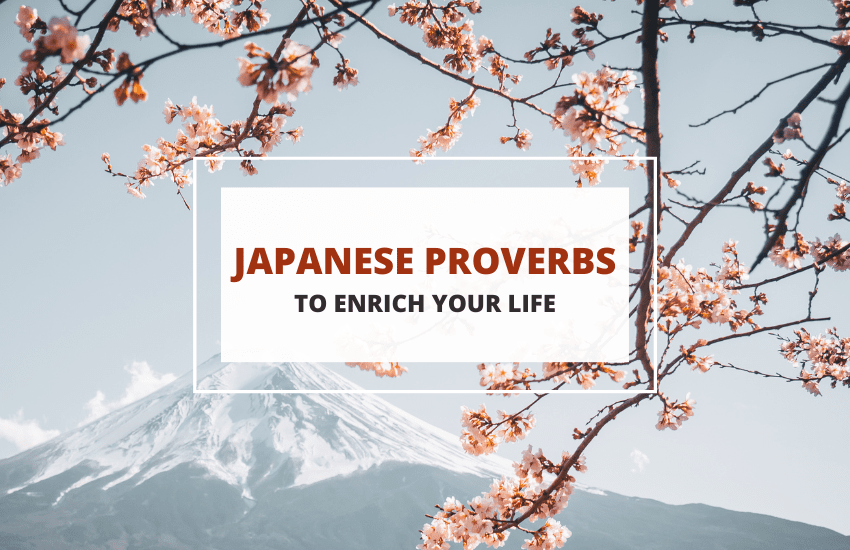
Table of Contents
Japan is well known for several things, including its age-old cultural knowledge, frequently reflected in Japanese proverbs. These sayings are typically short and the outcome of wise observations regarding Japanese culture and society.
Japanese proverbs are filled with ancient wisdom. You may have already heard some of them without realizing they had Japanese origin!
So, here are the most well-known and motivational Japanese proverbs that will help you expand your vocabulary and gain important life lessons from Japanese wisdom.
Types of Japanese Proverbs
Proverbs are sayings that have a specific meaning and are adopted in particular situations. They can be used to make a point or clarify specific circumstances.
Numerous proverbs date back to ancient Japan and are rooted in Japanese culture, history, and inherent wisdom. Let’s look into the three variations of these proverbs: 言い習わし (iinarawashi), 四字熟語 (yojijukugo), and 慣用句 (kan’youku).
1. 言い習わし (iinarawashi)
Iinarawashi is a concise proverb that contains words of wisdom. The name is a combination of the kanji characters for ‘speech’ (言) and ‘to learn’ (習).
2. 四字熟語 (yojijukugo)
Yojijukugo is a type of proverb made up of just four kanji characters. Since it’s made up entirely of kanji characters and is derived from Chinese proverbs, this type of sayings is the most difficult for beginners to understand in Japanese.
3. 慣用句 (kan’youku)
Kan’youku is an idiomatic phrase, but longer than yojijukugo. It is the lengthiest variety of Japanese proverbs.
Although they are all extremely similar, there are some subtle differences. It doesn’t matter what form of Japanese proverbs they are, but it matters to understand their significance and draw lessons from them.
Japanese Proverbs About Life

There may be times that you feel down or just don’t know what to do next. Here are a few Japanese proverbs that can help you find your way in life if you feel lost in the past or need some enlightenment.
1. 案ずるより産むが易し (anzuru yori umu ga yasushi)
English Translation: It is simpler to give birth than to ponder about it.
Sometimes, you might overthink what to do. You can interpret this simply as ‘don’t worry much about it.’ It’s simple to worry about the future, but most of the time, what we worry about is simpler than we believe it will be.
2. 明日は明日の風が吹く (ashita wa ashita no kaze ga fuku)
English Translation: Tomorrow’s winds will blow tomorrow.
Your current unfortunate circumstance shouldn’t worry you because everything changes with time. It also implies focusing on the now and avoiding being anxious about the future.
3. 井の中の蛙大海を知らず (I no naka no kawazu taikai wo shirazu)
English Translation: A well-dwelling frog has no knowledge of the ocean.
This well-known Japanese proverb denotes someone’s perspective on the world. They make snap judgments and have very high self-esteem. It serves as a reminder that the world contains things much broader than a person’s limited view.
4. 花より団子 (hana yori dango)
English Translation: ‘Dumplings over flowers’ or ‘practicality over style’
This means someone doesn’t care about material prosperity or fashion or someone who is less naive and more realistic. In essence, it’s a person who would choose useful tools over things meant for aesthetics only. Because after eating a dumpling, you won’t feel hungry again. Flowers are merely for display.
5. 水に流す (mizu ni nagasu)
English Translation: The water flows.
This Japanese proverb implies forgetting, forgiving, and moving on, similar to the English phrase “water under the bridge.” Holding onto past misfortunes typically makes no sense because it doesn’t change anything, like water under the bridge. No matter how difficult it may be to forgive, forget, and let the hurt drift away, it is best to do so.
6. 覆水盆に返らず (fukusui bon ni kaerazu)
English Translation: Water that has spilled won’t return to its tray.
What’s done is done, as the English saying, ‘there is no sense crying over spilled milk’ states. It serves no purpose to keep unresolved anger or sadness. For your own benefit, you should let it go and move on.
7. 見ぬが花 (minu ga hana)
English Translation: Not seeing is a flower.
The concept is that you may visualize how lovely the flower will be when it blossoms, yet frequently your imagination exaggerates the flower’s beauty while the reality falls short. It implies that sometimes, the reality is not as great as you imagined it to be.
Japanese Proverbs About Love

Are you currently in love? Or someone who’s hoping for your love to be reciprocated? There are a lot of Japanese proverbs about love that you might relate to. Here are some of the most common Japanese proverbs for love.
1. 恋とせきとは隠されぬ。 (koi to seki to wa kakusarenu)
English Translation: Both love and coughs cannot be hidden.
Love cannot be hidden, just as you cannot conceal a cough when you are ill. When a person is in love, it is always clear! People around you notice that you’re sick right away. The same is true of romantic love; you can’t help but be drawn to someone. Sooner or later, that special someone will realize your feelings.
2. 惚れた病に薬なし (horeta yamai ni kusuri nashi)
English Translation: There is no cure for falling in love.
There’s nothing that can heal love-sickness. Once someone falls in love, it is impossible to get them to turn around. It implies that love is something we experience with our hearts rather than something we can touch or see. In this way, having a strong affection for someone cannot be cured. It is wise to let love in if it comes knocking because fighting it won’t help.
3. 酒は本心を表す (sake wa honshin wo arawasu)
English Translation: Sake reveals true feelings.
Since the word ‘honshin’ implies ‘true feelings’, it follows that what is uttered while intoxicated frequently reflects one’s true feelings. When you mumble ‘I love you’ while drinking sake, it’s not just the sake of talking!
No matter how much you try to hold back your emotions, alcohol brings out everyone’s actual emotions. If you lack the guts to share your feelings with someone, you can also use them for your benefit.
4. 以心伝心 (ishindenshin)
English Translation: Heart to heart.
Hearts communicate through feelings and emotions. The only way to communicate with someone deeply in love is to express your true feelings from the heart. People with similar commitments are connected by this type of emotional communication because it is consistently open, private, and unrestrained.
5. 磯 の アワビ (iso no awabi)
English Translation: An abalone on the shore.
A marine snail called an abalone is quite uncommon. There’s a Japanese song that tells the story of a man who engages in a one-sided romance while diving in search of abalone. This expression eventually came to mean “unrequited love.”
6. 異体同心 (itai doushin)
English Translation: Two bodies, same heart.
It’s common to say that “two become one” when a couple gets married, and that’s exactly what’s happening here! When they eventually say their vows to one another, they become one body, soul, and spirit. Similar to when two people are soulmates, it’s common to sense this connection, which supports the idea that love is a union of two people.
Japanese Proverbs about Perseverance

Japanese proverbs regarding patience and hard effort are common because these traits are highly valued in traditional Japanese culture. These are the ones that Japanese people typically use.
1. 七転び八起き (nana korobi ya oki)
English Translation: ‘When you fall seven times, get up eight.’
This is the most well-known Japanese saying and sends a clear message to never give up. Being unsuccessful at first means you can try again. You’ve probably heard the English version of this, which says to try and try again ‘til you succeed.
2. 雨降って地固まる (ame futte chikatamaru)
English Translation: ‘When it rains, earth hardens.’
This has a similar tone to two proverbs in English: ‘the calm after the storm’ and ‘what doesn’t kill you makes you stronger.’ You get stronger for the storm when you survive it. After a storm, the ground hardens; similarly, adversity will make you stronger.
3. 猿も木から落ちる (saru mo ki kara ochiru)
English Translation: Even monkeys fall from trees.
Even the great can fail if monkeys can fall from trees. It’s the ideal thing to say to a friend battling with failure to motivate him to keep trying. Also, nobody is perfect. If you make a mistake, don’t feel bad about it; everyone makes mistakes occasionally, even professionals.
4. 三日坊主 (mikka bouzu)
English Translation: ‘a monk for 3 days’
This phrase denotes a person who is inconsistent in their work or lacks the willpower to see things through. They resemble someone who decides to become a monk but quits up after just three days. Who would even want to work with such an unreliable person?
Japanese Proverbs About Death

The proverbs that are most influential on us often deal with death. Death is a fact, yet no one has any idea what it’s like. Let’s review what these Japanese sayings have to say about death.
1. 自ら墓穴を掘る (mizukara boketsu wo horu)
English Translation: Dig your own grave.
This proverb means that saying anything stupid will get you into trouble. In English, we also frequently use the same expression as ‘to dig your own grave,’ which would be ‘to put your foot in your mouth.’
2. 安心して死ねる (anshin shite shineru)
English Translation: Die in peace.
This Japanese proverb is used to describe someone who died peacefully. You might also use it after a major problem is resolved, a lifelong ambition comes true, or significant anxiety is alleviated and makes you feel at ease.
3. 死人に口なし (shinin ni kuchinashi)
English Translation: ‘Dead men tell no tales.’
A dead person can’t say secrets or even anything. This is where this Japanese proverb comes from. Such lines can usually be heard in movies or from terror mafias and gangsters in the alleyways.
Wrapping Up
The Japanese language and culture are deeply rooted in proverbs. By studying Japanese proverbs, you can better understand the culture and people of Japan. Those can help you to develop relationships with others and educate you on Japanese culture and values.
If you’re looking for more cultural inspiration, check out our Scottish proverbs, Irish proverbs, and Jewish proverbs.








